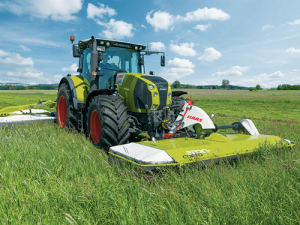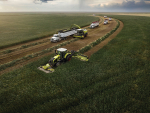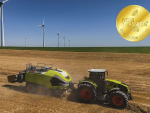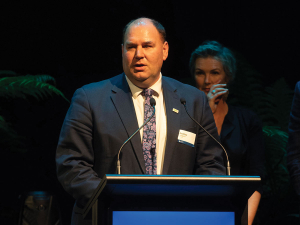After six years experience using the technology, Canterbury agricultural contractor Martin Bruce (M.A. Bruce Ltd, Darfield) vouches for the durability and reliability of the new Claas Max Cut cutter-bar.
Commercially released in New Zealand in 2015, Max Cut has an award-winning one-piece, wave-shaped design that protects the knives and ensures maximum overlap for optimal cutting quality, efficiency and durability.
Compared to the previous P-Cut cutter-bar, the cutting disc modules are set further forward, creating an enlarged cutting area; they have wear inserts with differing geometries, optimised as each pair of blades passes each other.
The cutter-bar has high torsional flexibility achieved by a special bolting process that matches the strength of welded seams, and the drive train is designed to be run from 850rpm, reducing fuel consumption by up to 20%.
Extra-wide skids guide dirt and foreign material backwards and guarantee a clean finish, minimising wear and protecting pasture cover.
MA Bruce Ltd contracts throughout central Canterbury, operating Claas harvesters and triple mower combinations; the firm was invited to participate in Max Cut pre-launch trials in 2009-10.
Based on the results of two season’s trialling, Bruce went on to buy its first Disco 9200 with the new bars in 2012-13, followed by a second unit; each rig averages around 2000ha per season.
Bruce comments, “Although they are starting to show a bit of wear and tear, they’re still pretty tidy machines for their age and I’d have no hesitation in running them for another couple of years.”
Max Cut uses the Claas existing ‘active float’ hydraulic suspension, Safety Link safety module and quick blade change system. In the event of a collision, the module shears at a pre-determined breaking point; and the mowers also have a ‘break back’ safety system that allows the mower to pivot backwards and upwards if an obstacle is encountered.
“The country we work in is rough on our gear and hitting things is a regular occurrence,” Bruce says.
“Auto-swathing allows us to avoid having to use rakes, which can bring foreign objects into the swath, but over time we’ve hit irrigation anchors, posts and rocks but have never broken a Max Cut bar on the rear mowers.”
Bruce notes that though the Safety Links do not activate very often, the working conditions and terrain have the machines getting through 2000 blades a year; these are changed in around 30 seconds with a simple lever tool that releases the spring plate under the disc.
www.harvestcentre.co.nz


















